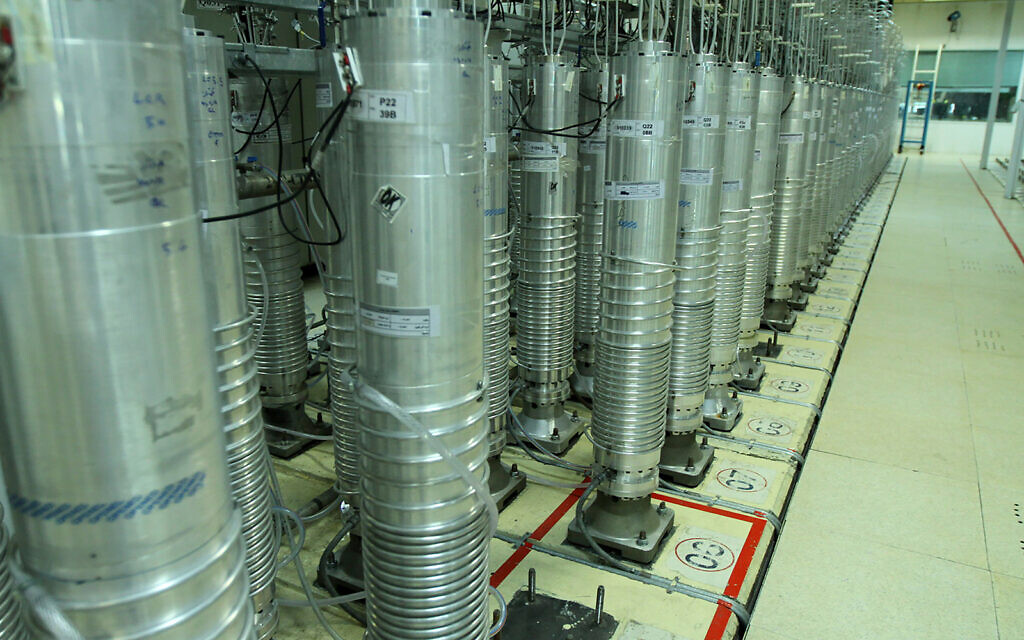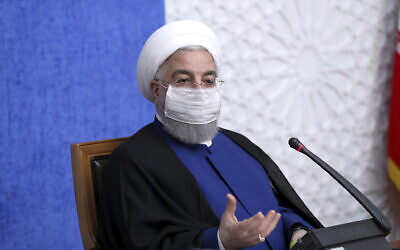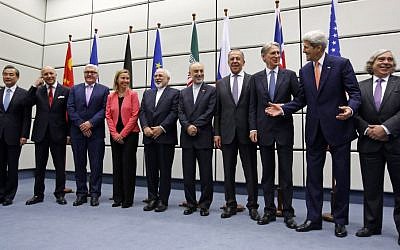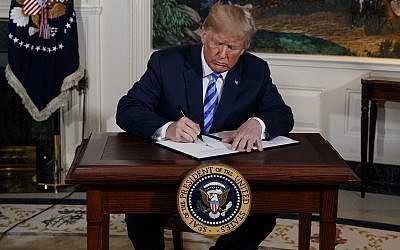
Israel warily eyes president-elect’s plans to rejoin JCPOA and
restart negotiations with Tehran, but some defense analysts see
an opportunity to capitalize on Trump’s sanctions.
When US President-elect Joe Biden enters office in January, one of the most pressing issues that he and his staff will have to deal with is Iran and its pursuit of a nuclear bomb.
But with Tehran reportedly poised to amass enough fissile material to produce such a weapon in the coming months, his task will be exceedingly difficult and fraught, with profound geopolitical ramifications for Israel and the Middle East and beyond.
For Israel, preventing an Iranian nuclear weapon — which the military consistently ranks as the most significant threat facing the Jewish state — is a top priority.

This nuclear brinksmanship has continued over the past two years, fueled in part by the Iranian regime choosing to wait for the results of the 2020 presidential election, in order to determine how best to bargain with the United States.
Biden will be forced to bring international partners on board, convince Iran to come back to the negotiating table in the lead-up to its presidential election and address the security concerns of not only Israeli, but also Sunni Arab states opposed to Tehran — and do all of this with the atomic clock ticking away.
While the Biden administration’s policies toward Iran’s nuclear program — and aggressive actions in the region in general — will be one of the most significant issues for Israel’s national security, it will not be the only one. The former vice president will also have to address Israel’s concerns over the sale of the F-35 fighter jet to the United Arab Emirates, which has not yet been finalized but appears likely to go through.

at Al-Dhafra Air Base in the United Arab Emirates,
September 10, 2019. (Tech. Sgt. Jocelyn A. Ford/US Air Force via AP)
Biden has promised to maintain Israel’s qualitative military edge (QME), the formal name for its military superiority in the Middle East, which the US is required by law to ensure remains intact, as a prerequisite for arms sales to other countries in the region.
His staff have also indicated that Biden would not likely sell the F-35 to other countries in the region — Qatar has already formally requested the plane following the UAE deal, and Saudi Arabia has also expressed interest — in light of the risks to Israel’s QME.
“The Obama-Biden administration made those planes available to Israel and only Israel in the region,” Tony Blinken, Biden’s top foreign policy adviser, told The Times of Israel earlier this month.
Iran breaking out
Iran is now exceedingly close to being able to develop a nuclear weapon, a situation that Israel has vowed not to allow. Under the so-called Begin Doctrine, named after prime minister Menachem Begin, who developed it, Israel has twice used military force to prevent a Middle Eastern country from developing an atomic bomb: Iraq in 1981 and Syria in 2007. In the years preceding the Iran deal, known as the JCPOA, Israel contemplated carrying out a similar strike on Iran’s nuclear facilities, but ultimately decided not to.
If pushed, Israel could revisit such a move, even at the risk of war with Iran and its proxies, notably the powerful Lebanese terror group, Hezbollah.
During his campaign, Biden broadly outlined his intentions vis-à-vis Iran: first, a return to the JCPOA, provided Iran gives up the nuclear material it has amassed in violation of the agreement and otherwise adheres to the deal; followed by, in conjunction with other world powers, negotiations with Tehran for a new nuclear agreement.
“If Iran returns to strict compliance with the nuclear deal, the United States would rejoin the agreement as a starting point for follow-on negotiations. With our allies, we will work to strengthen and extend the nuclear deal’s provisions, while also addressing other issues of concern,” Biden said in an opinion piece for CNN in September.

Iran, November 8, 2020. (Iranian Presidency Office via AP)
The proposal has led to a flurry of claims by Israeli politicians, notably Minister Tzachi Hanegbi, that it would force Jerusalem to act unilaterally against Tehran, potentially kicking off a war between Israel and Iran.
While such remarks appear in part to be signals to the Biden administration, Jason Brodsky, policy director for the United Against Nuclear Iran think tank, said they should not be dismissed as mere “bluster.”
“I don’t think those threats should be taken lightly,” Brodsky told The Times of Israel.
According to Brodsky, a long-time observer of Iran and its nuclear program, Israel would likely be prepared to act militarily against Tehran if it believed that Biden planned to rejoin the JCPOA with no concrete plans to completely block Iran’s development of an atomic weapon.
“This would reinforce the concern of many in the Israeli security establishment that the nuclear deal paves the way to a nuclear bomb and doesn’t cut one off,” he said.
Indeed the situation is fraught and only poised to get more complicated as Iran is scheduled to hold presidential elections in June 2021 and has been seeking to purchase weapons from Russia and China as a United Nations arms embargo against it comes to an end.

Chuck Freilich, a former Israeli deputy national security adviser, warned that this convergence — Biden’s inauguration, Iran’s rapidly approaching nuclear breakout point, proposed Russian and Chinese arms sales and the upcoming Iranian elections — mean that the US president-elect will be forced to act rapidly or risk having to wait for the Iranian election and transition — with all the uncertainty that brings.
“Either they do something quickly or they wait almost a year before they have someone to speak with,” Freilich told The Times of Israel.
Brodsky, however, said he believed the Iranians would not rush to create an atomic bomb, but would continue to amass fissile materially in greater quantities and levels of enrichment to ratchet up the pressure, while not crossing the Rubicon of nuclear armament, in order to keep the possibility of a deal alive.
“They will carefully calibrate their actions,” Brodsky said. “They want to save this accord.”
Freilich generally supported the JCPOA at the time and opposed the US’s withdrawal from it in 2018, though he has maintained that the US likely could have negotiated a more robust agreement.

for a group photo at the UN building in Vienna, Austria,
on July 14, 2015. (Carlos Barria, Pool Photo via AP)
Though Netanyahu and some in Israel’s defense establishment viewed the nuclear deal as wholly disastrous — giving Tehran international standing and access to money while only delaying, not outright blocking, its race to a bomb — other senior Israeli officials saw the benefits of taking the nuclear issue off the table, even temporarily, and recognizing that a more comprehensive agreement to halt not only Iran’s nuclear efforts, but also its missile programs and other destabilizing activities in the region was not feasible at the time.
While Freilich said he generally believes a Biden-appointed negotiating team could be counted on to be “good, centrist and realistic,” he expressed concerns that the president-elect’s proposal to return to the JCPOA could give up the current leverage that the US has over Iran from Trump’s sanctions, which have left Tehran in dire economic straits.
Can you skip over the return [to the JCPOA] stage and go directly to a new deal?
“Trump’s Iran policy was a failure in my opinion, but he did create this leverage,” added Freilich, who now lectures at Tel Aviv University and Columbia University in New York.
Though he said the US may have to make some kind of concession in order to restart negotiations, were Biden to re-enter the JCPOA and remove the economic sanctions that the Trump administration put in place, the US would potentially be giving up a crucial bargaining chip in what would already be extremely difficult negotiations.

withdrawing from the Iran nuclear deal from the Diplomatic
Reception Room of the White House, on May 8, 2018.
(AP Photo/Evan Vucci)
As it stands, according to Freilich, while some in Iran would support restarting talks with world powers, the country’s hardliners would likely argue that “you can’t trust the Americans” and make the claim convincingly in light of Trump’s decision to withdraw from the deal despite US intelligence services, Israeli intelligence services, and the International Atomic Energy Association determining that Iran had been adhering to the agreement — however flawed the JCPOA may have been.
Brodsky took a somewhat harder stance on the issue, maintaining that the US should not make any concessions going into negotiations and should not rush into talks.
“The US should not be in a rush to negotiate. The US has more leverage here,” he said, citing Iran’s plummeting economic standing.
Brodsky also disagreed on the importance of the upcoming Iranian elections, saying that while a change in president for Iran may shift the tone of Tehran’s rhetoric or the makeup of its negotiating team, the fundamental decisions will ultimately be made by Supreme Leader Ali Khamenei, not by the president.
He noted that the United States’ original back channel with Iran that paved the way to the JCPOA was established under Iranian hardliner Mahmoud Ahmadinejad.
Freilich questioned the logic of simply returning to the JCPOA, a deal that — by its very nature — is set to end in the next five years.
“Can you skip over the return [to the JCPOA] stage and go directly to a new deal?” he mused.
Former US ambassador to Israel Daniel Kurtzer predicted that Biden would indeed return to the JCPOA, even against the wishes of Israel.
“Of course there are always some issues on which we will disagree. I think [the] Iran nuclear program may be one of those. But I would anticipate that President-elect Biden will try to talk very seriously about this with the prime minister rather than doing anything unilaterally,” Kurtzer told Israel’s Army Radio on Sunday.
Researchers at the Institute for National Security Studies, one of Israel’s premier think tanks, issued similar warnings in a paper released Sunday outlining the potential ramifications for Israel of the US president-elect’s national security policies.
“Biden has been opaque on the Iranian demand, presented as a precondition for entering negotiations, that all sanctions are lifted and compensation is made for the consequences of the re-imposed US sanctions. In any scenario, whether negotiations are renewed or Iran takes further escalatory steps, Israel should anticipate gaps between its interests and those of the United States,” wrote research fellows Michal Hatuel-Radoshitzky and Eldad Shavit.
While Freilich expressed his concerns about the United States’s way forward on the Iranian nuclear front under President-elect Biden, he nevertheless saw this as a safer option than such a move under Trump, whom he feared would have potentially negotiated a worse agreement with the Iranians purely for the sake of brokering a deal.
“I trust Biden,” Freilich said. “I would not have trusted Trump to negotiate a new deal because I think his goal in a second term was winning a Nobel [Peace Prize]… and that could have meant selling out the store.”
(Times of Israel).